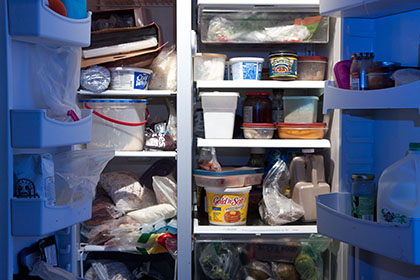As a lady who lives on Earth, I have some body issues. Luckily, these didn’t really start for me until I was 17 (which is apparently, and distressingly, a pretty late age to begin worrying about this stuff, considering that some start as young as 9 years old.)
The Old
So, what happened at age 17? The birth control pill. Over the course of the first two to three months I was on it, I gained 20 pounds. I was definitely never skinny to begin with, but this was the first time I thought of myself as actually “fat.” Before the year was out, I was on Weight Watchers and I stuck to it pretty diligently. I lost that 20 pounds after following the program for a few months but even though the scale said 145, I still looked in the mirror and felt 165. And, yet, despite insisting that the fat-free ice cream (which, as someone who has since made her own ice cream—how is that created??) tastes just as good as the regular, religiously checking the calorie count on all the breads at the supermarket and weighing that against the size and density of the slices, going to bed hungry and looking forward exclusively to eating in the morning, I was done.
Policing one’s weight is hard work. I didn’t want to do it anymore. But I had been raised to be a hard worker, to not quit just because I haven’t succeeded, and to excel at all the things I do. So a few months later, I tried again, with some other plan. And then another. And another. They really all blurred together over the next six years or so. But in trying and failing to lose weight, I gained it. And kept gaining. Sometimes, just deciding to count calories again would be enough and I wouldn’t even lose anything, just start to slowly gain. I would constantly berate myself with the pinpoint-accurate, harsh criticism that only I can inflict on myself. Too bad fat shaming doesn’t actually motivate weight loss and actually predicts weight gain instead, ‘cause that’s what happened.
It took a long time to realize that my sizeism was hurting me. (How interesting—there is a red squiggly line under this word. “Did you mean ‘sexism’?” Microsoft Word asks. No. Then again…) It took even longer to realize that the reason I had trouble (strike that, have trouble) letting go of my sizeism is because that would mean that I would have to reject that idea that if I were just less lazy and weak-willed, I could be better. To accept the idea that I’d been going about it all wrong for five freaking years. But I had been.
Dieting does not work. Not even if you don’t call it a diet. Not even if you are just “trying to eat healthier” or “just eating whole foods” or “counting calories.” It is actually, as that last link explains and my body can tell you firsthand, a predictor of future weight gain. Because, of course, those things do work! For a while. And then they don’t anymore and you end up with more health problems than you would have if you had just stayed kinda fat, which is, in fact, not a health problem.
As you can probably tell, this is something I have spent a lot of time and feelings on. About a year ago, I was seriously freaking out. I weighed more than I ever had, I was feeling like crap about myself, and whenever I even thought about dieting, my body started freaking out from deprivation anxiety and I couldn’t last a week. The definition of insanity is when a person tries the same thing again and again and blahblahblah… I’m still fat. That’s when I went crazy with the online research. That’s when I finally admitted I had a huge body image problem and a terrible relationship with food. That’s when I went to see a body image counselor.
The New
Here is what I do now: I practice intuitive eating. I do not restrict what I can eat—I’ll eat whatever I damn well please, since restricting it is what screwed me up in the first place. But I do pay attention to my fullness. I do consider how my body will feel—not look, feel—after eating whatever I’m considering. And I do work to take care of my stress, unhappiness, loneliness, and whatever-other-feelings with methods that are not soothing them with tasty food. My love of cooking has been both a help and a hindrance to this. I cook what I want, just like I eat what I want, but I still try to consult with my digestive tract to figure out what is going to make me the happiest. I try—and this is always a battle—to truly and honestly consider my health, vitamins, nutrients, and essential food groups, etc. over my weight when making dinner. This is the hardest thing I still struggle with.
As for exercise, I similarly exercise where and when and how I want. I try to refuse exercise that I feel like I “should” do and only do what I want to do. Instead of daily runs and elliptical work, I get to do an activity that I actually really enjoy doing, instead of just appreciating it as a way to burn calories. I regularly practice yoga, bike to work, dance in tap classes, and play Quidditch. Doing exercise because I like it while I’m doing it instead of just feeling self-congratulatory afterwards gives me the opportunity to do it without the guilt and self-pressure to exercise as a means of eating more. I can’t tell you how many times I’ve gone for a run (a thing I despise) instead of riding my bike because it was a faster calorie burn and I was having people over for dinner later. This is a recipe for a terrible relationship with both exercise and food.
Finally, a part of what I do that you won’t find in any size policing plan: managing my psyche. Real talk: I’d love to lose some of the weight I’ve gained from my past dieting experiences. It would be awesome. But to avoid dieting again—a constant temptation despite my past experiences—I work hard to make sure I feel happy and beautiful how I am. As a big Pinterest fan, I noticed I felt lousy every time I went on—because all the fashion boards I follow have only skinny white women. I immediately found five “fat fashion” boards to follow. Seeing these beautiful women of all shapes and sizes and colors makes me feel like I can be beautiful too. We see obese people in the world a lot, nearly always portrayed as lazy, stupid, face-stuffers. It is no wonder that nearly everyone is sizeist, even fat and obese people! Seeing them as beautiful and sexy everyday does wonders.
Clothes shopping is another battle against feeling good, but I do it because I like fashion and want to get dressed every morning feeling like I look stylish and fun. For a long time, I kept thinspiration clothes in my closet, hoping, knowing that I would fit into them someday. What a great way to feel like shit every morning! I have since gotten rid of them and replaced them with things that look good on me now.
Keeping up with fat acceptance and fat positivity bloggers has been awesome. This is more deprogramming of my sizeism and it makes me a better human to both others and myself. Isabel Foxen Duke is sassy and funny and sends weekly e-mails reminding me to continue the awesomeness. Others: Dances with Fat, Nude Muse, and Fat Nutritionist.
The Future
To even suggest, let alone say outright, that I am all fantastic and super happy all the time in my fat body and always make the best choices would be ridiculous. I’m still learning. But I do:
- Refuse to bully myself or let others bully me around food and exercise choices
- Actively work to love myself and how I look
- Allow myself to thoughtfully eat whatever the hell I want to and exercise however and whenever the hell I want to
- Seek out others who will support my positivity
Let me tell you: these things make a huge difference. It’s a lot of work to love yourself, especially if that self is not deemed “loveable” by society. But it is most definitely worth the effort.

Photo by Michelle White
